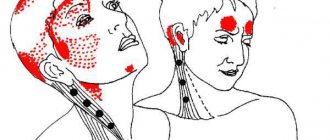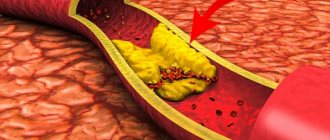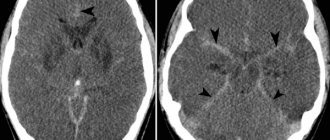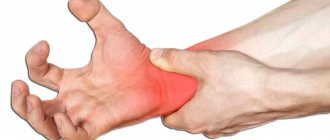Senile dementia in men - a common occurrence after 60 years. It is important to notice the first signs of how your loved one is changing. The sooner you consult a doctor with complaints, the faster the diagnosis will be made and the more effective the treatment will be. Honey offers modern methods of therapy that will help stop the process and improve the quality of life of patients.
What is dementia in older men and its causes
Dementia (dementia) is a disease characterized by a set of symptoms that appear as a result of pathological processes in the tissues of the brain. A person experiences memory deterioration, thinking disorders, and loss of habitual skills to such an extent that they complicate everyday life and normal work. The older a person is, the higher the risk of getting sick.
The cause of the disease can be:
- natural aging processes;
- pathologies of the thyroid gland;
- vascular disorders (ischemia, hypertension, atherosclerosis, etc.);
- neurological disorders (stroke, head injury);
- intoxication with alcohol or drugs;
- chronic poisoning with toxic substances;
- a brain tumor.
As can be seen from the reasons, dementia can be age-related and early - developing in young and middle age.
Senile insanity: Features of the disease
Age-related insanity is a pronounced mental disorder, which is characterized by complete or partial collapse of personality. This process of manifestation of dementia ultimately leads to the loss of opportunities to communicate with others. The person suffering from the disease loses basic life skills. The development of the disease gives rise to irreversible mental changes in the brain, which pose a danger to loved ones.
In this matter, timely diagnosis plays an important role. It is thanks to her that the process of personality disintegration can be stopped at the initial stage.
In women, the disease occurs much more often, has more pronounced symptoms and progresses faster than in older men. However, in the initial stages it is quite treatable.
How it starts, main signs
The first signs appear after 60 years. There is an interesting feature - the risk of dementia doubles every 5 years. Among the elderly after 70 years, the proportion of patients is about 25%, after 80 years - every second one. It is important to pay attention to the early signs of dementia. After all, they are noticeable 5-10 years before the appearance of clear symptoms of the disease itself! If you learn to notice them, you can help your loved one in time.
Be sure to consult with your doctors if your loved one:
- O - forgets the day of the week, buy food, where he left his glasses.
- Has great difficulty remembering new information.
- Old, “dear to the heart” memories are easily recalled, but what happened yesterday is forgotten.
- Complains of absent-mindedness and fatigue.
- Speech becomes impoverished, forgets simple everyday words.
- Does not understand jokes and proverbs without prompting.
- Likes to tell the same stories and ask the same questions without delving into the interlocutor’s answer.
- He gets lost in a familiar place and doesn’t find his way home.
- Has a violation of planning and sound criticism: dresses inappropriately for the weather, goes outside in a dressing gown.
- Confused about money and unable to count change correctly in a store.
- Forgets to eat.
- He neglects changing clothes and wears the same clothes day after day.
- Laughter gives way to tears (weakness).
- Notices physical weakness due to forgetting to eat and not feeling thirsty.
Over time, a loss of interest occurs, and as a protective reaction of the body, there is a fear of everything new. 30% of sufferers experience mild symptoms of depression (insomnia, decreased or decreased appetite, anxiety). This allows you to suspect “something is wrong.” Further manifestations of depression become more severe. The person does not believe in the success of the treatment, is sad, often cries from the hopelessness of the situation, grief, and does not understand what is happening to him. At first, he denies all symptoms and explains them by “external circumstances.” It is important to know that with this combination of symptoms there is a high risk of suicide attempts.
Forecast
Marasmus is more often diagnosed in patients over 60 years of age; the prognosis of how long the patient will live after diagnosis is made individually. Patients need care and observation. Behavior control is necessary to prevent the commission of dangerous acts that may threaten the health of the patient and others.
Patients often forget to turn off gas and electrical appliances, which can lead to a fire. Life expectancy varies significantly, most often being about 8-10 years from the moment the first signs appear. How long individual patients live depends on the form of dementia, the extent of brain damage, the rate of disease progression, the quality of treatment and organized care.
Senile insanity is a disease caused by the processes of natural aging and unfavorable external influences; the first thing that relatives need to do when the debut signs of cognitive deficit appear is to consult a doctor.
Kinds
Dementia acts as an independent disease or accompanies others. There are several varieties:
- Alzheimer's disease. This is the most common form of dementia in men over 60 years of age. It is characterized by increasing forgetfulness of current affairs with retention of memory for ancient events. For a long time, the only symptom observed is forgetfulness.
- The vascular form is the second most common. Risk factors include smoking, male gender, high cholesterol. Such patients suffer from high blood pressure, coronary heart disease and diabetes. They often have a history of strokes, heart attacks, and changes in the retina of the eyes. Memory impairment is not as severe as in Alzheimer's disease. The onset of the disease is acute.
- Mixed form. It is more malignant - vascular disorders worsen the course of Alzheimer's disease.
Diagnostics
The main task of differential diagnosis is to distinguish senile dementia from conditions accompanied by similar symptoms. These include changes in the level of consciousness (delirium), mild cognitive disorders (for example, aphasia - loss of speech due to damage to the speech centers of the brain), amnestic syndrome (memory disorder for events of the present while retaining memories from the past).
With the progression of cognitive deficit, an instrumental examination is carried out - CT, MRI, during which disorders are identified - tumor processes, hydrocephalus, vascular pathologies and deterioration of blood supply to the brain tissue. If there are atrophic changes in the brain matter in combination with deterioration of cognitive abilities, a diagnosis of Alzheimer's disease is made.
Laboratory tests show the concentration of glucose, cholesterol and other substances, which makes it possible to diagnose hypothyroidism and anemia. Special tests help determine the level of memory and cognitive decline. It should be taken into account that cognitive deficits can develop against the background of side effects of pharmaceutical therapy, which is carried out as part of the treatment of chronic somatic diseases.
Stages
This disease has several stages:
- The first is the most inconspicuous and, perhaps, the most insidious. It practically doesn't show up at all. If you are attentive to a man, you will notice that a person close to you begins to forget some things, behaves unusually, and sometimes cannot complete a simple assignment.
- The second is perhaps even heavier than the third. Precisely for relatives caring for them. The patient no longer remembers loved ones, does not always recognize himself in the mirror, leaves the apartment on his own or completely refuses to leave it. Periodically forgets where the toilet is in the apartment, how to brush his teeth, take a shower, and becomes more irritable. He ceases to be interested in books, cinema, television, theater, and concerts. Possible weight loss.
- The third stage is the last. As a rule, the patient stops getting out of bed, loses his appetite, and requires constant care.
Exercises
You can treat insanity at home with the help of special exercises that involve the patient’s intellect. They complement the main therapy well. They should be used only if the senile person has such a desire. If he does not want this, then forcing him by force is categorically not recommended.
Effective exercises against insanity:
- Watch. The patient must draw a clock face. When he succeeds, you can move on to drawing arrows. The task is then complicated by the need to specify the time.
- Comparison. Select 5 objects, one of which differs in one of the main qualities. The task will be to define this subject.
- Poems. The patient just needs to memorize simple poems. It is advisable to choose from the easiest options possible, gradually complicating the task.
- Modeling. You need to prepare plasticine, and then set a goal for the patient to mold something specific. The difficulty should increase periodically.
- Songs. You should select the patient’s most favorite pieces of music and try to memorize their parts with him, then sing along to the music.
It is very important to increase the difficulty of the exercises performed gradually. Harshness can lead to the old man's inability to cope with the task, which will cause negative emotions in him, negatively affecting the overall results.
Dementia in men - how to help your husband or loved one
What to do if your husband has dementia? As a rule, wives notice the first signs. Because in old age, the children have long since moved away, but the spouse remains nearby.
Suspecting something was wrong:
- Contact the Leto clinic. Our specialists will assess the patient’s condition and develop the most effective tactics for further action.
- Go to your appointment already prepared - with examinations performed (MRI of the brain or X-ray of cerebral vessels).
- Decide to live together. At least starting from the second stage of the disease, this cannot be avoided.
- Closely monitor your medication intake. This will delay the onset of the next stage of the disease as much as possible.
- At least once every two years, be sure to visit the specialist you contacted to correct your treatment. This disease progresses, and the doses of the devices taken need to be increased.
- Don’t forget to give your man some easy tasks: sweep the floor, wash the dishes, dress or undress yourself, wash your face, brush your teeth. Sing old songs with him, turn on your favorite music, do some modeling or putting together puzzles.
- At all stages, provide emotional support and encouragement.
- Be prepared for the upcoming changes in life.
- Do not allow the use of a personal car, recommend public transport, take care of a personal driver.
- Come together or bring your husband to special support groups.
- Maintain hydration and remind your spouse about water.
- Monitor his overall physical health.
- Learn more about community support resources.
- If you have difficulties with simple household chores, explain slowly and show how to do it.
- Leave things in their original places.
- Read one book, watch a movie, and then discuss.
- If necessary, put reminders on sticky notes in capital letters.
- You're kidding! Humor prolongs and improves life.
Registration of a sick person in a boarding house for the elderly
The nursing home is ready to gladly accept even those people who have senile dementia. The private boarding house "Valentina" offers first-class care for sick people. All requests and wishes of both the elderly person and his close relatives are taken into account here. In this boarding house, specialists monitor the health status of each client every day. If necessary, they provide the patient with first-class medical care. This institution has everything necessary to ensure complete safety for people with this illness. The nursing home is located in a picturesque corner of the Moscow region. It is surrounded by a tennis park where people can enjoy walks and a lake, which creates a comfortable atmosphere.
Unfortunately, senile dementia is a very dangerous and unpleasant disease that brings discomfort to both the patient and his loved ones. Not all relatives have the time and energy to constantly be near an elderly person. In order not to provoke unpleasant situations, it should be registered in the private boarding house “Valentina”. It employs highly qualified personnel who take their duties responsibly. Here, customer service is provided at the highest level, as a result of which not only he, but also his loved ones will be satisfied. Professional help will be needed if a person with dementia behaves aggressively or distractedly. Patients who cannot care for themselves also require special care and treatment. The nursing home employs responsible people who are ready to take full responsibility.
For guests with senile dementia in a private boarding house the following is offered:
- well equipped private room;
- constant surveillance;
- daily health check;
- accommodation at an affordable price policy;
- six dietary meals a day;
- moral support;
- 24-hour professional care;
- treatment control.
Unfortunately, it is now impossible to get rid of senile dementia forever. But modern medicine offers special medications that slow down the development of this disease. This treatment alleviates the plight of both the patient and his loved ones. Psychosocial rehabilitation is also an integral component of effective therapy.
The private boarding house offers guests the following:
- Creating a comfortable atmosphere. The effectiveness of treatment largely depends on the situation.
- Respectful attitude of the staff towards every elderly person. Nursing home workers are ready to feed the patient, wash him, etc.
- Safe living. The presence of anti-slip flooring, handrails, and a small amount of furniture guarantees complete safety for a person with senile dementia.
- Respectful attitude and constant support. Specialists communicate with people, listen to their requirements and wishes.
You can book a room for an elderly relative by calling 8-495-003-19-56 or using the online call back form.
How you can help your doctor
For diagnosis, it is very important to know what happened and what happened. Stories from loved ones and colleagues will help with this. After all, it is necessary to understand whether a person had a rich vocabulary or not. There are very subtle differences between dementia and normal aging changes.
Before your visit, try to remember and write down some points related to your husband’s dementia.
- What prevents you from living with a person with dementia and what does he complain about?
- Note significant events that have occurred recently (retirement, children's weddings, birth of grandchildren, loss of loved ones).
- Make a list of all the medications the patient takes (medicines, vitamins, food supplements).
- Have you ever had dementia in your family?
- Previous operations, recent illnesses (take all the necessary papers).
- When the symptoms appeared, were they constant, what brought relief?
Recommendations for relatives
Elderly patients with senile dementia require constant support. To do this you will need:
- Create a cozy and favorable atmosphere at home;
- Talk to the patient only in a calm tone;
- Address a person by name;
- When speaking, you should use simple phrases and words;
- Help with daily activities: dressing, eating, bathing, showering;
- When communicating, you should remember the old days;
- It is necessary to repeat the phrase if the patient does not understand its meaning.
Cost of services
| CONSULTATIONS OF SPECIALISTS | |
| Initial consultation with a psychiatrist (60 min.) | 6,000 rub. |
| Repeated consultation | 5,000 rub. |
| Consultation with a psychiatrist-narcologist (60 min.) | 5,000 rub. |
| Consultation with a psychologist | 3,500 rub. |
| Consultation with Gromova E.V. (50 minutes) | 12,000 rub. |
| PSYCHOTHERAPY | |
| Psychotherapy (session) | 7,000 rub. |
| Psychotherapy (5 sessions) | 30,000 rub. |
| Psychotherapy (10 sessions) | 60,000 rub. |
| Group psychotherapy (3-7 people) | 3,500 rub. |
| Psychotherapy session with E.V. Gromova (50 minutes) | 12,000 rub. |
| TREATMENT IN A HOSPITAL | |
| Ward for 4 persons | 10,000 rub./day |
| Ward for 3 persons | 13,000 rub./day |
| Ward 1 bed VIP | 23,000 rub./day |
| Individual post | 5,000 rub. |
| PETE | 15,000 rub./day |
This list does not contain all prices for services provided by our clinic. The full price list can be found on the “Prices” , or by calling: 8(969)060-93-93. Initial consultation is FREE!
Prevention
There are no guaranteed ways to help protect yourself from such a disease after aging. However, there are a number of useful tips that can help reduce the risk of developing marasmus. They must be performed regardless of age.
Preventive measures:
- eat tomatoes and watermelons regularly;
- expand your diet with foods containing vitamins B6, B12 and B15;
- add more fish to the menu, it is advisable to choose white meat;
- at least sometimes eat a little garlic;
- take Ginkgo biloba extract;
- exclude fatty, fried and too sweet foods;
- lead an active lifestyle, play sports;
- be checked periodically by different doctors.
It is also recommended to stop drinking alcohol, smoking and any other bad habits. Only the right lifestyle can reduce the likelihood of developing insanity.
Symptoms and signs of senile insanity can create a lot of problems for the patient. If you do not fight them, the condition will gradually worsen, and the prognosis will become unfavorable. It is very important to identify the disease in a timely manner and take all necessary measures to eliminate it. Of particular importance in such a situation is the help of relatives in properly caring for the old man. This will help suppress symptoms, giving the patient a chance to live a full life.
Treatment of dementia in men at the Leto clinic
As a rule, with age-related dementia you have to deal with several diseases, so the treatment plan is selected strictly individually. The therapeutic regimen takes into account measures aimed at treating the underlying disease and normalizing blood pressure. Particular emphasis is placed on improving cerebral circulation. With the development of psychotic disorders, antidepressants, antipsychotics, and anticonvulsants are indicated.
You need to understand that prescribed drugs only slow down the development of the disease. In most cases, a man with dementia will no longer go to work and will never be the same as he was before. But he will be able to take care of himself independently, he will understand where he is and who is next to him. This will change your life too. The sooner you start taking the medications, the faster the effect will be visible. Even at the advanced second stage, you can achieve good results only over a longer period. Much attention is paid to psychotherapy and training in nursing skills.
Are you facing dementia in older or middle-aged men? Just dial 8(969)060-93-93 .
We provide assistance both in the hospital and at home.
Folk remedies
You can also use folk remedies for treatment. Their use should be very careful, since sometimes the components can cause allergies or provoke an exacerbation of chronic diseases. A preliminary consultation with a doctor is recommended.
How to treat manifestations of senile insanity using folk methods:
- Buy dried or frozen blueberries, cover them with water and put on fire for 15 minutes. Drink one glass of prepared compote every day.
- Pour half a liter of vodka into one spoon of elecampane root, close and let it brew for one month. Drink one spoon three times a day before meals.
- Grind dry sage castings, take one spoon and pour half a liter of boiling water, leave for half an hour. Take up to 4 times a day.
- Pour boiling water over some fresh mint leaves with grated ginger root and let it brew. Take cool daily. There are no volume restrictions.
- Mix one spoon each of valerian, mint and rose hips, pour a liter of boiling water over them, let it brew for about 20 minutes. Drink half a glass twice a day.
It is not recommended to add sugar to compote or tea. It is advisable to replace it with a small amount of natural honey. It has a positive effect on the general condition of the body, but can be harmful if abused.
If the patient does not like the taste of the prepared drinks, then you can simply add blueberries to his regular tea.
Traditional methods also include therapy using oils. Mint, lemon balm, orange, lavender, clove or cocoa will do. They can be added to the bath and lie in it for at least half an hour, used for body massage, or simply rubbed into the skin.











